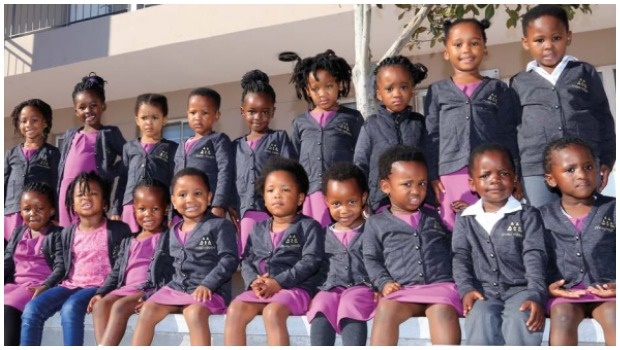
They line up on purple yoga mats, their giggles filling the studio as they start a sun salutation. Prompted by music playing in the background, the girls eagerly stretch up high before reaching down to tickle their toes. After completing a series of yoga poses they return the mats to a big box on the side of the room.
It’s breakfast time and they take their seats at rows of little tables. With the aroma of mealie meal wafting through the air they say grace before they happily dig in. The children are all learners at Molo Mhlaba – a private school for girls in the heart of Khayelitsha, Cape Town’s largest township.
Headmaster and co-founder Dr Rethabile Sonibare (34) says the school’s name, which means “Hello World”, is a statement of empowerment. “We’re communicating to the world that the time is now. Women are here. Black girls are here.”
Molo Mhlaba seeks to empower young girls from the community through a unique curriculum – including subjects such as Lego robotics, yoga and mindfulness, and an introduction to computers, the internet and coding.
“We wanted to create a safe space for girls and debunk the myth you can’t get a high-quality education in townships,” Rethabile says.
The school’s values of Ubuntu, individuality, honesty and integrity are pasted on the walls in its teaching languages – English and isiXhosa. The school, which opened in January, is the brainchild of Rethabile, who holds a PhD in social work.
It emerged from a remedial programme run from a nonprofit organisation (NGO) she’s part of. “We faced a lot of criticism and second guessing in the beginning,” she says.
“People didn’t believe we could build a school of this nature with little funds, but we proved them wrong.” The school has one class of girls aged between three and six. They work in age groups under the instruction of one qualified teacher and a teacher-in-training. A third teacher is also employed at the school, and Rethabile says the provincial education department provides them with learning outcomes.
The school started with four learners but now boasts 26. For Grade R admission a child must be four turning five by 30 June and for Grade 1 the child must be five turning six by 30 June in the year of admission.
Rethabile takes us around the two-storey brick structure that looms large over the sea of neighbouring shacks. The school rents the premises from a non-profit organisation in partnership with the City of Cape Town, and shares the space with residents as the building also houses a community hall.
“We wanted to find a building that’s worthy of the school we plan to build,” she says. Rethabile, mom to daughters Leyabona(5) and Anam (1) and son Zaeem (2), has lived in the township all her life. “When I had Anam I realised she was going to grow up in the same environment I grew up in, which didn’t prioritise girls.
“If she wasn’t strong enough and didn’t complete matric, her opportunities would be limited. I was desperate to change that for her, her peers and future generations.”
Rethabile launched Thope Foundation and the school was birthed from the NGO as a deliberate investment in the future of girls by providing safe, affordable and quality education.
“We just have two requirements: they have to be verbal and out of nappies. And, of course, they have to be girls,” Rethabile quips.
While some of the girls, who all live in the community, walk to school, others use school-arranged transport.
Molo Mhlaba’s policy prescribes that it uses only women service providers. The school strives to create a structure to supplement the lack of structure some girls have in their homes, Rethabile says. Still, the decision to take part in activities is up to the child.
“Our girls come from different backgrounds and you have to be sensitive to that. We’re an emotive school. We give hugs and love.” This, she says, teaches them about boundaries and consent, which will come in handy in relationships later in life.
“We don’t want the school to be a place they don’t want to be at.” The girls have free will as long as their choices are not detrimental to others. This also applies to the school uniform – learners can choose between a purple tunic or grey pants or no uniform at all.
A quick glance around the room confirms a variety of hairstyles.
“We’re a democratic school,” Rethabile says, “All we ask is that hair is kept out of their faces.”
The school encourages a reading culture and the book nook is stacked with material ranging from classic fairytales to a guide on how to explain racism to your daughter. There’s also an isiXhosa copy of Lucy and Stephen Hawking’s George’s Secret Key to the Universe.
It was translated by the passionate advocate of multilingual education Xolisa Guzula, who is also the school’s chairperson. Although diverse, the library – made up mostly of donated books – is still limited and on some days learners walk to the public library across the road.
Molo Mhlaba strives to provide quality education at a low cost. Each pupil is funded through a 4-4-4 model: parents pay R400 a month, R400 comes from grant funding and R400 from sponsor-achild programmes, Rethabile explains. Each learner receives a uniform pack and stationery upon enrolment. Breakfast and lunch are included in the fees. The convenience was part of the attraction for Gcina Mondi, whose daughter Zenazi Lolo Tutani attends Molo Mhlaba. “I remember her first day in January.
I expected her to cry but I was surprised that my three-year-old felt so comfortable around people she had just met. When I fetched her in the afternoon she didn’t want to leave.”
The proud dad says Zenazi is already benefiting from the teaching methods.
“The children are given a sense of independence. Zenazi now wants to open the car door herself when we get home, and she wants to wash her socks. The love of learning is promoted through reading. She often takes books to read at home.”
Rethabile’s daughter is now a year old, and she can’t wait for little Anam to join the school, which she hopes will have grown by then.
“We need to increase the numbers so we can qualify for a government subsidy.” The school plans to extend its programme by introducing the six-to-nine-year age group then the nine-to-12- year group to create a fully functional high-impact primary school. And even then, only half the battle would be won, Rethabile cautions.
“Our test of success will be how many girls we get into high-impact high schools and universities.”
Talk about girl power!


















